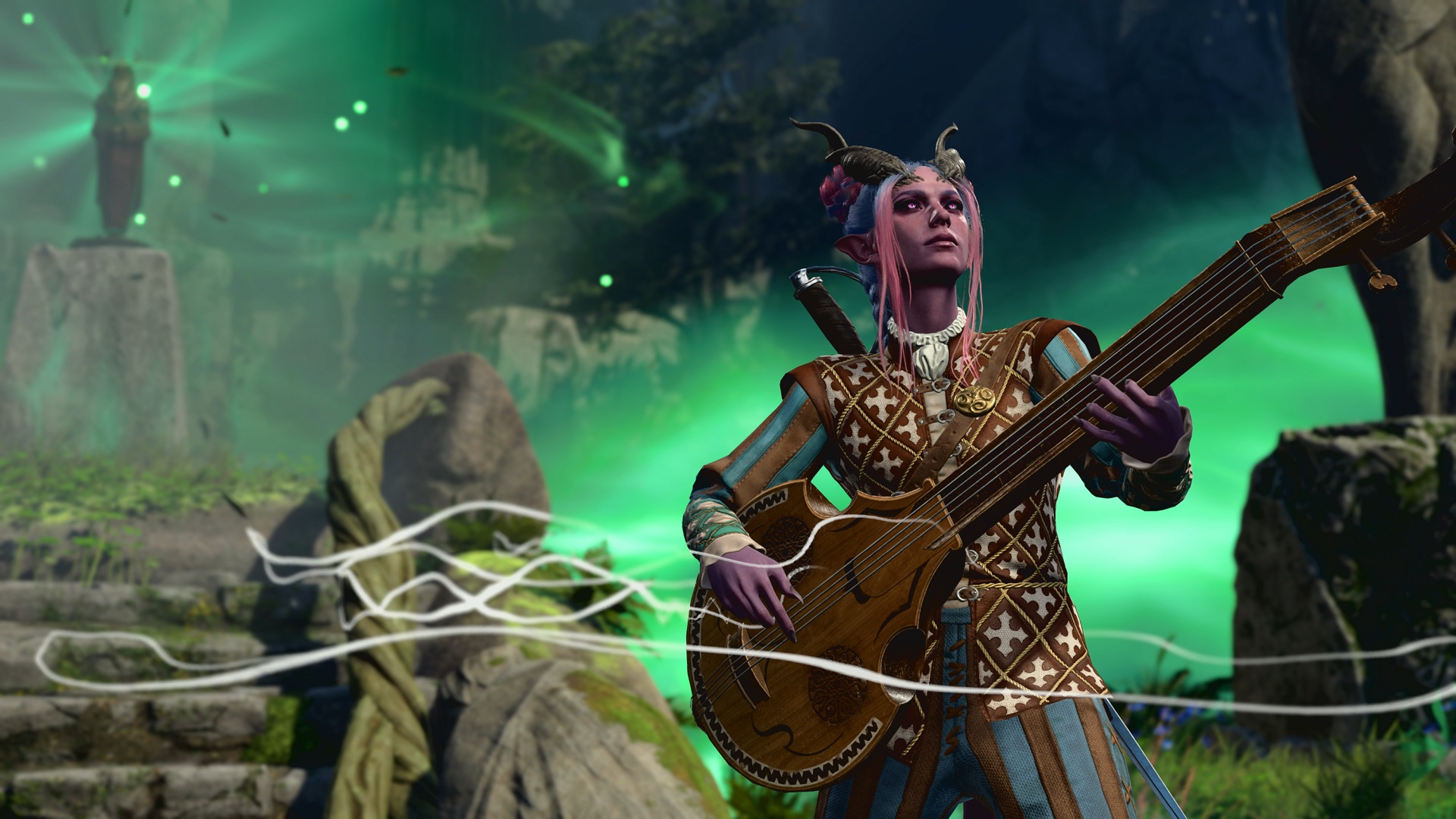
I never thought I'd say this, but my first Baldur's Gate 3 character will be a Bard. The horny, rizzed-up scourge of Dungeon Masters everywhere has captured my heart in the game's early access, and now I'm genuinely not sure how I'd make my way to the titular city without one. And as much as I have known hatred deep in my heart for D&D's troublesome troubadours, I'm here to make the case for why you should take a musical maestro into your first playthrough.
First, there's a genuine, developer-sanctioned case for choosing the bard over several of D&D's other classes. In a recent interview, game director Sven Wincke recommended taking a custom character into your first Baldur's Gate 3 playthrough, as opposed to one of the bespoke Origin characters. Those Origin characters have their classes baked in, so assuming you follow Larian's advice and opt to play one of them on a subsequent playthrough, you can confidently skip over the Cleric, Barbarian, Fighter, Rogue, Wizard, and Warlock classes, safe in the knowledge that you'll be able to play as one of them when you return to the Origins.
But that leaves Druids, Rangers, Sorcerers and plenty more as valid options, so why the Bard? As a former Dungeon Master myself, I'll admit to finding the class a nightmare to deal with - towards the end of BG3 prequel campaign Descent into Avernus, my party's own Bard boasted an almost game-breakingly high Charisma score, and seemed determined to break the game apart with his gift of the gab. In the tabletop version, it felt like a class without a real identity, piggybacking off a bunch of other archetypes to embody its iconic 'Jack of All Trades' skill. So what changed?
To put it simply: I had to start actually playing D&D. While I've been on the other side of the table since that campaign, I was once what's known as a 'forever DM' - someone who's never actually played the game they're running. Think of it like a referee who's never kicked a football in their life, but still knows all the rules better than the players. Since diving back into Baldur's Gate 3 early access, my eyes have been opened to the joys of working out an alternative route around a problem. While there's joy to be had in the blunt force of the martial classes, the creative problem solving of the magic users, and the stealthy approach of the Rogues and Rangers, by far the most diverse way to play is by simply talking things out.
Jam Out

"But the best thing that the Bard has to offer? Ability scores so high that they're nearly game-breaking."
But the Bard's silver tongue is by far its most famous feature, so before we get onto that, let's talk about what else you can achieve with D&D's legendary lutist. For one thing, it's always a good idea to have a support class, and if you don't want to deal with the religious zeal of the Cleric (or you're already journeying with Shadowheart), the Bard is easily the strongest contender. A nice combination of ally buffs, enemy nerfs, and control spells like Silence and Thunderwave have turned my Bard into a pretty handy toolbox of spells, and they're pretty handy with a crossbow, too.
And that's before you get to their class-specific tools. As much as I enjoy snaffling up enough food to Long Rest my way along the Sword Coast, the Bard ability Song of Rest - which offers an extra, team-wide burst of healing - is a great way to keep my party on its feet a little longer. The class' other signature ability, Bardic Inspiration, is similarly strong, able to instill a substantial bonus to an ally whether in or out of combat. Perhaps my favorite ability, however, is the dedicated 'Jam Out' button, which lets you simply play a little tune. It confers basically nothing on your ability to actually play the game, but it's certainly a nice way to add a little extra immersion to your character.
But the best thing that the Bard has to offer? Ability scores so high that they're nearly game-breaking. The aforementioned Jack of All Trades offers a healthy +1 to every score that you're not already proficient in, which is nice in a pinch, but even well within Act 1 the real winner are my Charisma scores. I've got a +8 to my Persuasion and Deception scores, and a +7 to Intimidation, and that's before I borrow from extra buffs like Guidance or Charm Person. At my current point in the game, it's genuinely difficult to fail Charisma rolls.
In a tabletop game, that might be used for the Bard's notorious seduction techniques, but in Baldur's Gate 3 it opens up dozens of alternative ways to experience the game. Larian's combat is as good as ever, and I'm having a lot of fun when the knives come out, but it's definitely more interesting to find a slightly more pacifistic way to play where you can. There's certainly a challenge to taking on the fights where the odds are stacked against you, but you get to see more of what the game has to offer by playing just a little bit nicer, and that feels like a slightly more authentic realization of the D&D fantasy that Baldur's Gate 3 is shooting for.
I'm having so much fun running intellectual rings around the goblins and gnolls of Baldur's Gate 3's first act that I've already built a full party around my Bard; Astarion, Shadowheart, and newcomer Karlach will round out the group around my charismatic main character. Exactly how long that group holds together (especially as they head into the darker, more dangerous environments of the game's second act) remains to be seen, but I know for certain that I'll be singing and strumming my way through the game's first few hours.
Thinking about what character you'll create? Be sure to check out our guides to Baldur's Gate 3 classes, Baldur's Gate 3 races, Baldur's Gate 3 backgrounds, and Baldur's Gate 3 skills.







